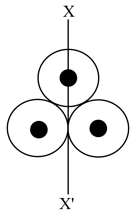MEDIUM
NEET
IMPORTANT
Earn 100
Which of the following statements are correct?
(i) Centre of mass of a body always coincides with the centre of gravity of the body.
(ii) Centre of mass of a body is the point at which the total gravitational torque on the body is zero
(iii) A couple on a body produce both translational and rotational motion in a body.
(iv) Mechanical advantage greater than one means that small effort can be used to lift a large load.
(a)(ii) and (iv)
(b)(i) and (ii)
(c)(ii) and (iii)
(d)(iii) and (iv)
47.62% studentsanswered this correctly

Important Questions on Motion of System of Particles and Rigid Body
EASY
NEET
IMPORTANT
Two rotating bodies, and of masses, and with moments of inertia and have equal kinetic energy of rotation. If, and be their angular momenta, respectively, then,
EASY
NEET
IMPORTANT
A solid sphere of mass, and radius, is rotating about its diameter. A solid cylinder of the same mass and same radius is also rotating about its geometrical axis with an angular speed twice that of the sphere. The ratio of their kinetic energies of rotation will be
EASY
NEET
IMPORTANT
A light rod of length, has two masses, and attached to its two ends. The moment of inertia of the system about an axis perpendicular to the rod and passing through the centre of mass is
MEDIUM
NEET
IMPORTANT
From a disc of radius and mass , a circular hole of diameter , whose rim passes through the centre is cut. What is the moment of inertia of the remaining part of the disc about a perpendicular axis, passing through the centre?
EASY
NEET
IMPORTANT
A uniform circular disc of radius at rest is free to rotate about an axis which is perpendicular to its plane and passes through its centre. It is subjected to a torque which produces a constant angular acceleration of . Its net acceleration in at the end of is approximately:
EASY
NEET
IMPORTANT
A disk and a sphere of same radius but different masses roll off on two inclined planes of the same altitude and length. Which one of the two objects gets to the bottom of the plane first?
EASY
NEET
IMPORTANT
A particle of mass moves along a circle of radius with a constant tangential acceleration. What is the magnitude of this acceleration if the kinetic energy of the particle becomes equal to by the end of the second revolution after the beginning of the motion?
EASY
NEET
IMPORTANT
Three identical spherical shells, each of mass and radius are placed as shown in the figure. Consider an axis which is touching the two shells and passing through the diameter of the third shell. The moment of inertia of the system consisting of these three spherical shells about axis is:

